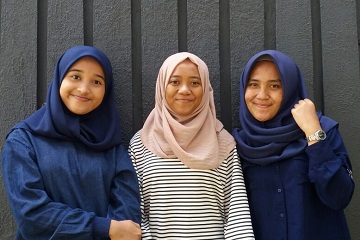IPB Students Control Soy Leaf Rust Disease with Bacteria

High community needs for soybeans are not comparable to national soybean production. One of the causes of the decline in soybean production is the attack of soybean rust disease which can reduce production by 90 percent.
From these problems, students of Bogor Agricultural University (IPB) developed the formulation of endophytic bacteria from brotowali plants as an alternative medicine for soybean rust disease. The three students were Desy Eka Putri, Wahyuning Dwi Novitasari, and Lisa Bela Fitriani from the Faculty of Agriculture of IPB. The solutive idea passed as one of the finalists of the Student Creativity Program (PKM) guided by Dr. Ir. Abdul Munif M.Sc Agr.
Desy said that endophytic bacteria from brotowali plants have many advantages when used as pest control plants.
"At present we need to control plants that are environmentally friendly and economical, so we try to use organisms in the form of endophytic bacteria from brotowali plants. Brotowali plants are medicinal plants that can be used to cure soybean rust. In addition, pest control is also not dangerous if eaten by humans, "Desy explained.
Desy explained that the success of endophytic bacteria to suppress leaf rust disease was effective and easy to apply.
"We try to form a liquid form of endophytic bacteria to be easily applied with a mixture of coconut water, sucrose and palm oil. So the seeds to be planted are soaked first into a new mixture of formulations sown on the ground. So far endophytic bacteria that have passed the test are bacterial codes of BBT 106 which can suppress the attack of soybean rust disease and increase crop production around 59-60 percent better than control conditions (without endophytic bacteria), "explained Desy.
Desy and the team hope that the impact of this research can be beneficial for increasing soybean production. "The hope is that provincial-level soybean production can increase so there is no need to import soybeans. In addition, hopefully it can be applied with farmers after being developed on a large scale, "Desy hoped. (NR)


